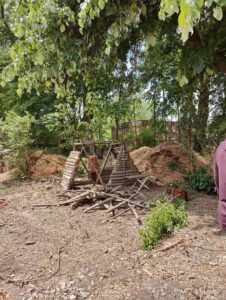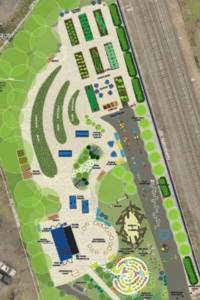Mt. Airy EcoLab
Mt. Airy EcoLab is a formerly fallow lot adjacent to SEPTA’s Carpenter Regional Rail station recently reclaimed by West Mt. Airy Neighbors and other local volunteers. With support from a National Park Service grant and other regional organizations, we’re creating a resource hub to spur the neighborhood’s evolution into an “eco village”: Somewhere we can all work together to experience nature-based play, cultivate food, and help our urban ecosystem. Learn more in this article recently published in Grid.
Check out the draft plan for the site, then get involved! Sign up to volunteer, make a donation, or even help us identify all the wildlife and plants around the site through our iNaturalist page.
Got ideas? Contact us today!
What’s Going On?
We’re turning this vacant land into a community hub — the first step toward making Mt. Airy an “eco village.”

 Located at the back of the station, the plot is approximately 200 feet long by 100 feet wide, just past the edge of the parking lot. It was previously neglected, with the railway on one side and a failing fence on the other. Neighbors often reported dumping in this area, but since this project has started, dumping has stopped.
Located at the back of the station, the plot is approximately 200 feet long by 100 feet wide, just past the edge of the parking lot. It was previously neglected, with the railway on one side and a failing fence on the other. Neighbors often reported dumping in this area, but since this project has started, dumping has stopped.
WMAN won a grant from the National Park Service – Rivers, Trails, and Conservation Assistance program (RTCA) for planning assistance to support this community-driven project. Partners and boosters who provided letters of support include SEPTA, Sustainable Choices, LLC, Mt Airy Tree Tenders, Pleasant Advisory Council, Henry H. Houston Elementary, Glitter, East Mt. Airy Neighbors, ECHO Systems, and Mt. Airy Community Development Corporation.
We’ve already begun restoring the plot’s trees, including 25 new trees for the edible hedgerow: apples, pears, figs, serviceberries, mulberries, and chokeberries. We’ve received complementary grants from the Society of Women Environmental Professionals to build six large raised beds filled with fresh soil to support our on-site intergenerational gardening program, and from Feet First Philly and the Clean Air Council to create a Junior Tree Tenders program for youth in our community to learn how to properly plant and care for young trees. Other plans include native plant propagation, a tree nursery, rainwater collection, soil remediation, a wetlands area, an intergenerational gardening program, a micro-nursery to support greater biodiversity, pollinator patches, and more.
The NPS-RTCA program will begin with background work, community listening sessions, and identifying funding sources throughout the summer, supporting WMAN in collecting community input and creating a master plan for the site. RTCA will also help scout for other spaces in the broader community that could become future greening sites, gardens, or eco-hubs.


